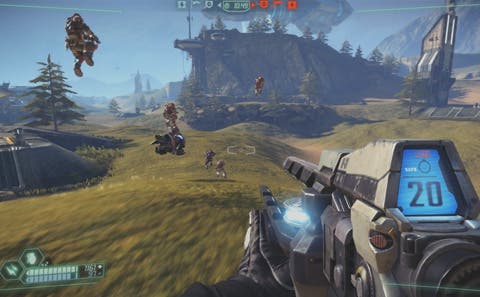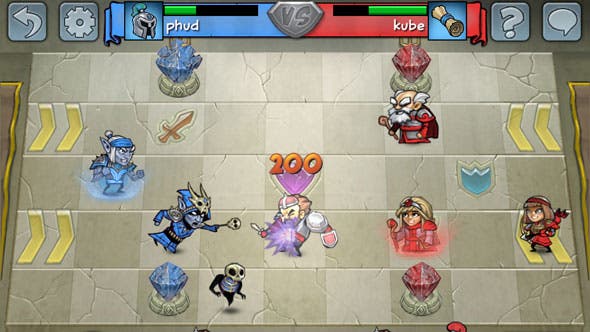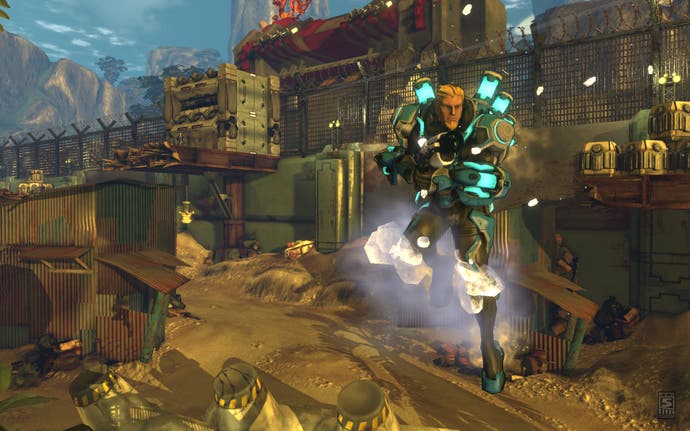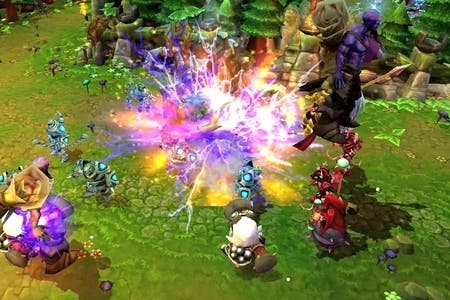Saturday Soapbox: F2P FTW?
As free-to-play games land on consoles, Chris Donlan re-examines his own prejudices.
I can't remember when it was that I first heard about Dota, but I can, weirdly enough, remember where I was. I was in the kitchen of an indie developer that I was visiting for a preview article - the kind of place where everyone had lunch together - and someone on staff was talking about this niche ultra-hardcore Warcraft mod they liked. Dota.
Dota's still pretty hardcore, I guess, but it would be tricky to call it niche anymore. The beta for Valve's sequel is fairly all-consuming, while League of Legends, which is heavily influenced by Dota, is now one of the biggest games in the world.
What happened? I'm not sure, and I'm almost certain it was a Gordian knot that I'm far too stupid to unpick, anyway. One thing I do suspect was fairly central to this success, though, was a breakthrough in the way that games are sold. Developers drew crowds to the Dota template - and were able to subsequently invest in its evolution - in part because games worked out a way to be free.
Free and profitable, of course: that's the trick. One of the reasons League of Legends has grown so influential is because it's making money, and it's making money in part because it's attracted an audience by giving the basic game away gratis. Load up League of Legends and you'll be able to play without dropping a single dime in the slot. Money becomes a factor when you want to get serious about things, buying specific champion characters, say, rather than waiting for them to appear in rotation. Elegant stuff: people can see if the game's for them before paying anything. If it isn't, then they're off, after providing a bit of collateral content for everyone else. And if it is? Well, if it is, they can buy things that will help them play the game the way they want to play.

I've been thinking about this recently, because I've had a horrible realisation. Two, actually. Firstly, I've realised that I don't think of League of Legends as a free-to-play game, even though it palpably is - even though it's the free-to-play elements that have allowed it to become so refined and so popular, and to serve its hardcore community so well. More importantly though, I've realised that this is because, subconsciously, I don't seem to see very many of the free-to-play games I like as being free-to-play. They're just games to me, and the business model only comes in if I think a developer's being manipulative or sneaky.
This is quite an embarrassing thing to admit, really. I've often accused designers of approaching free-to-play as a genre instead of a business model - it doesn't have to be a certain kind of game, it's just the way you fund your game, right? - and yet, all this time, I've unwittingly been doing something much worse. I've been approaching it as a pejorative, with the nastier examples of free-to-play mechanics becoming a stand-in for the whole lot. Lucky I don't write about games for a living or anything like that I suppose.
Part of the reason for this - and here's another confession - is that I've only recently bought a proper PC. If I'm talking with PC gamers about free-to-play, I'm far more likely to get a positive response, and I'm starting to see why. PC gamers have had free-to-play for ages now, and plenty of these games are great. I love League of Legends and I'm starting to feel the itch for World of Tanks, too. Over the next few years, looking at the more traditional PC game market alone, who doesn't want Hawken, Firefall, Planetside 2? All free-to-play games. All just games, as well.

For console gamers - and I appreciate that this is often a slightly artificial distinction - it's a different story. With few examples to draw on, it's easy to let the whole free-to-play thing get tangled up with other elements in your mind. Micro-transactions have started to creep into titles like Rainbow Moon and Hybrid, and when they're stuck in a game that you've already paid for, they're not the best ambassadors. With no real experience of the good stuff, it's not that hard to then conflate free-to-play with the most annoying aspects of its implementation: Zynga's endless prodding, the energy systems on Facebook games, the wonky grind of badly-made iOS rush jobs. This kind of thing is a real concern, of course. As GamesIndustry International reported at a recent GDC Online panel, developers are worried about it too. But it's not the whole picture.
There's a good chance that you're a console gamer and you don't think like this at all, of course. There's a good chance that if I mentioned free-to-play, you'd reply, "Oh, like Temple Run? Like Hero Academy?" I did think like this, though, and I didn't really realise I did. A recent trip to the Free-to-Play Summit in Shoreditch, where I was part of a critique panel, made me realise how negative I'd become about the business of free-to-play in fact, and how one-sided my view of the marketplace was.
You know the bit at the beginning of a summer blockbuster where the crazy scientist makes a speech that's so shocking and brilliant that people hate him for it and they walk out? That was the panel I was on, really, except I wasn't being shocking and brilliant and proving that another ice age was imminent or that the moon was hollow and all the dinosaurs had headed there when the meteor struck. Instead, I was just spouting slightly outdated stuff about a complex, varied business model, moaning about unnecessary grind and the loss of a sense of game ownership. Again, both of these are legitimate concerns in certain cases, I think, but I could have been balancing that out with some of the better things free-to-play offers: the fact that it's allowed the team at Robot Entertainment to build a community that blurs the lines between so-called casual and hardcore players, around a genuinely smart game, say, or that Imangi uses micro-transactions without cutting in on anybody's fun.
It was another of those moments - increasingly common, these days - where I've realised afresh that huge parts of the games industry are changing, and they're changing in big, scary-and-exciting ways. Is free-to-play going to wipe away the traditional market entirely? I'd really like to think that it isn't. I'd like to think that there will always be people who love the big games, the small games and the squeezed middle tier and want to buy them outright and enjoy them that way.

I'm pretty sure that it is going to become more prevalent, though - on consoles as well as PC. With it, it will bring more poorly-calibrated energy systems, more games that are designed wholly around micro-transactions, and more games where the grind means that they're just queues in which you can pay to leap ahead a few places. There will be more horrible sims and bungled RPGs that will have me thanking my stars for stuff that comes with a price up-front.
It will also allow weird new ideas to flourish like the Dota model has, though, and it may bring brilliant, unexpected tweaks to existing classics. I hope so, anyway, because the games are already starting to appear on consoles, and it would be nice if some of them were good. Dust 514's in open beta on the PS3, while Japanese Vita owners have Picotto Knights, a free-to-play brawler that may one day find its way to Europe. Just this week, Happy Wars hit Xbox Live. It's a free MOBA that's a bit like Dota. It's powered, fairly elegantly by the looks of it, by micro-purchases.
As for me, I'm starting to look forward to more free-to-play stuff, like Mighty Quest for Epic Loot, and I'm increasingly likely to spend some of my time with those games I've already forgotten are free-to-play anyway.
At the Eurogamer Expo the other day, I was telling a game developer acquaintance about my initial difficulty accepting free-to-play, about my early fears that it was all money-grabbing conceits and bad design choices. He laughed, possibly slightly pityingly, and thought for a few seconds. "It's always like that at the start," he said eventually. "And there's always the fact that, when this industry does anything new, it tends to get it wrong at first. Then it slowly starts to get it right, and it all ends up adding to the possibilities."

